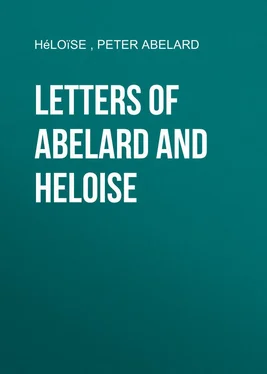Array Héloïse - Letters of Abelard and Heloise
Здесь есть возможность читать онлайн «Array Héloïse - Letters of Abelard and Heloise» — ознакомительный отрывок электронной книги совершенно бесплатно, а после прочтения отрывка купить полную версию. В некоторых случаях можно слушать аудио, скачать через торрент в формате fb2 и присутствует краткое содержание. Жанр: foreign_antique, foreign_prose, на английском языке. Описание произведения, (предисловие) а так же отзывы посетителей доступны на портале библиотеки ЛибКат.
- Название:Letters of Abelard and Heloise
- Автор:
- Жанр:
- Год:неизвестен
- ISBN:нет данных
- Рейтинг книги:3 / 5. Голосов: 1
-
Избранное:Добавить в избранное
- Отзывы:
-
Ваша оценка:
- 60
- 1
- 2
- 3
- 4
- 5
Letters of Abelard and Heloise: краткое содержание, описание и аннотация
Предлагаем к чтению аннотацию, описание, краткое содержание или предисловие (зависит от того, что написал сам автор книги «Letters of Abelard and Heloise»). Если вы не нашли необходимую информацию о книге — напишите в комментариях, мы постараемся отыскать её.
Letters of Abelard and Heloise — читать онлайн ознакомительный отрывок
Ниже представлен текст книги, разбитый по страницам. Система сохранения места последней прочитанной страницы, позволяет с удобством читать онлайн бесплатно книгу «Letters of Abelard and Heloise», без необходимости каждый раз заново искать на чём Вы остановились. Поставьте закладку, и сможете в любой момент перейти на страницу, на которой закончили чтение.
Интервал:
Закладка:
Peter Abelard
Letters of Abelard and Heloise / To which is prefix'd a particular account of their lives, amours, and misfortunes
PREFACE
It is very surprising that the Letters of Abelard and Heloise have not sooner appeared in English, since it is generally allowed, by all who have seen them in other languages, that they are written with the greatest passion of any in this kind which are extant. And it is certain that the Letters from a Nun to a Cavalier , which have so long been known and admired among us, are in all respects inferior to them. Whatever those were, these are known to be genuine Pieces occasioned by an amour which had very extraordinary consequences, and made a great noise at the time when it happened, being between two of the most distinguished Persons of that age.
These Letters , therefore, being truly written by the Persons themselves, whose names they bear, and who were both remarkable for their genius and learning, as well as by a most extravagant passion for each other, are every where full of sentiments of the heart, (which are not to be imitated in a feigned story,) and touches of Nature, much more moving than any which could flow from the Pen of a Writer of Novels, or enter into the imagination of any who had not felt the like emotions and distresses.
They were originally written in Latin, and are extant in a Collection of the Works of Abelard , printed at Paris in the year 1616. With what elegance and beauty of stile they were written in that language, will sufficiently appear to the learned Reader, even by those few citations which are set at the bottom of the page in some places of the following history. But the Book here mentioned consisting chiefly of school-divinity, and the learning of those times, and therefore being rarely to be met with but in public libraries, and in the hands of some learned men, the Letters of Abelard and Heloise are much more known by a Translation, or rather Paraphrase of them, in French, first published at the Hague in 1693, and which afterwards received several other more complete Editions. This Translation is much applauded, but who was the Author of it is not certainly known. Monsieur Bayle says he had been informed it was done by a woman; and, perhaps, he thought no one besides could have entered so thoroughly into the passion and tenderness of such writings, for which that sex seems to have a more natural disposition than the other. This may be judged of by the Letters themselves, among which those of Heloise are the most moving, and the Master seems in this particular to have been excelled by the Scholar.
In some of the later Editions in French, there has been prefixed to the Letters an Historical Account of Abelard and Heloise ; this is chiefly extracted from the Preface of the Editor of Abelard's Works in Latin, and from the Critical Dictionary of Monsieur Bayle 1 1 Vide Artic . Abelard, Heloise, Foulques, and Paraclete
, who has put together, under several articles, all the particulars he was able to collect concerning these two famous Persons; and though the first Letter of Abelard to Philintus , in which he relates his own story, may seem to have rendered this account in part unnecessary; yet the Reader will not be displeased to see the thread of the relation entire, and continued to the death of the Persons whose misfortunes had made their lives so very remarkable.
It is indeed impossible to be unmoved at the surprising and multiplied afflictions and persecutions which befel a man of Abelard's fine genius, when we see them so feelingly described by his own hand. Many of these were owing to the malice of such as were his enemies on the account of his superior learning and merit; yet the great calamities of his life took their rise from his unhappy indulgence of a criminal passion, and giving himself a loose to unwarrantable pleasures. After this he was perpetually involved in sorrow and distress, and in vain sought for ease and quiet in a monastic life. The Letters between him and his beloved Heloise were not written till long after their marriage and separation, and when each of them was dedicated to a life of religion. Accordingly we find in them surprising mixtures of devotion and tenderness, and remaining frailty, and a lively picture of human nature in its contrarieties of passion and reason, its infirmities, and its sufferings.
The History of Abelard and Heloise
Peter Abelard was born in the village of Palais in Britany. He lived in the twelfth century, in the reigns of Louis the Gross , and Louis the Young . His Father's name was Beranger , a gentleman of a considerable and wealthy family. He took care to give his children a liberal and pious education, especially his eldest son Peter , on whom he endeavoured to bestow all possible improvements, because there appeared in him an extraordinary vivacity of wit joined with sweetness of temper, and all imaginable presages of a great man.
When he had made some advancement in learning, he grew so fond of his books, that, lest affairs of the world might interrupt his proficiency in them, he quitted his birthright to his younger brothers, and applied himself entirely to the studies of Philosophy and Divinity.
Of all the sciences to which he applied himself, that which pleased him most, and in which he made the greatest progress, was Logick. He had a very subtile wit, and was incessantly whetting it by disputes, out of a restless ambition to be master of his weapons. So that in a short time he gained the reputation of the greatest philosopher of his age; and has always been esteemed the founder of what we call the Learning of the Schoolmen .
He finished his studies at Paris, where learning was then in a flourishing condition. In this city he found that famous professor of philosophy William des Champeaux, and soon became his favourite scholar; but this did not last long. The professor was so hard put to it to answer the subtle objections of his new scholar, that he grew uneasy with him. The school soon run into parties. The senior scholars, transported with envy against Abelard , seconded their master's resentment. All this served only to increase the young man's presumption, who now thought himself sufficiently qualified to set up a school of his own. For this purpose he chose an advantageous place, which was the town of Melun, ten leagues from Paris, where the French court resided at that time. Champeaux did all that he could to hinder the erecting of this school; but some of the great courtiers being his enemies, the opposition he made to it only promoted the design of his rival.
The reputation of this new professor made a marvellous progress, and eclipsed that of Champeaux. These successes swelled Abelard so much that he removed his school to Corbeil, in order to engage his enemy the more closer in more frequent disputations. But his excessive application to study brought upon him a long and dangerous sickness, which constrained him to return to his own native air.
After he had spent two years in his own country he made a second adventure to Paris, where he found that his old antagonist Champeaux had resigned his chair to another, and was retired into a convent of Canons Regular, among whom he continued his lectures. Abelard attacked him with such fury, that he quickly forced him to renounce his tenets. Whereupon the poor monk became so despicable, and his antagonist in such great esteem, that nobody went to the lectures of Champeaux, and the very man who succeeded him in his professorship, listed under Abelard , and became his scholar.
Читать дальшеИнтервал:
Закладка:
Похожие книги на «Letters of Abelard and Heloise»
Представляем Вашему вниманию похожие книги на «Letters of Abelard and Heloise» списком для выбора. Мы отобрали схожую по названию и смыслу литературу в надежде предоставить читателям больше вариантов отыскать новые, интересные, ещё непрочитанные произведения.
Обсуждение, отзывы о книге «Letters of Abelard and Heloise» и просто собственные мнения читателей. Оставьте ваши комментарии, напишите, что Вы думаете о произведении, его смысле или главных героях. Укажите что конкретно понравилось, а что нет, и почему Вы так считаете.












